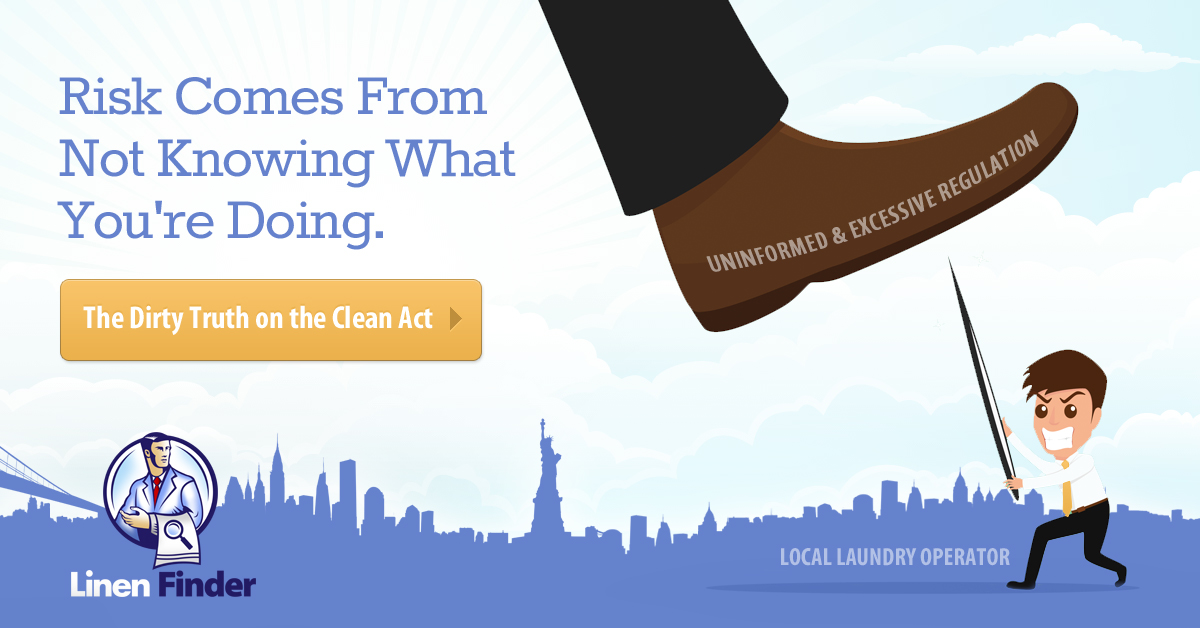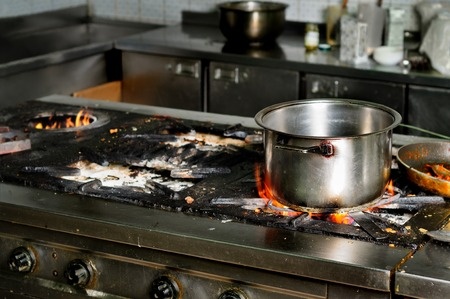Holiday Restaurant Linen Shortage
A tragic story of a holiday restaurant linen shortage..
Don’t let your restaurant have a shortage of tablecloths and napkins this Holiday Season. Check out our rendition of Twas The Night Before Christmas!

Don’t let your restaurant have a shortage of tablecloths and napkins this Holiday Season. Check out our rendition of Twas The Night Before Christmas!

Businesses outside of New York are likely unfamiliar with The CLEAN Act (City Laundry Equity and Accountability), a New York City Council bill that would require industrial laundries which process linens for hospitals, hotels, and restaurants to be licensed and regulated by the city’s Department of Consumer Affairs.
The bill is sponsored by New York City Council Member Ritchie Torres, whose experience inside industrial laundries is slightly longer than the reading time of this blog post. In fairness though, his business experience is equally limited – given that he was born in 1988 (yes, this makes him 6 years older than Justin Bieber). While the bill contains some good intentions, it is largely uninformed and would place unnecessary burdens on local businesses. It will ultimately also be subsidized by the tax payers of New York. There are existing national and local regulations for commercial laundries that still carry penalties for violations. There is also scientific based research conducted by independent non-profit organizations which offer various certifications for commercial laundries that are built upon decades of research from 3rd and 4th generation laundry operators and suppliers to the industry. You can learn about these certifications and more regarding laundry compliance at www.laundrycompliance.com.

Much of the bill is based on a report titled “Irresponsible Industrial Laundries: A Major Public Health Threat”, a report from NYC Council Member, Ritchie Torres and CLEAN NYC. While there is some factual information provided, it lacks full context and fails to provide the information available to business owners who seek to ensure their linens and uniforms are delivered “Clean”. While the existing industry regulations and non-profit association certifications use science to further awareness and safety, the Council’s report highlights two primary sections; both consist of two former laundry worker’s “claims”. Even if their claims about two laundries are accurate, that’s hardly a sample size indicative of this country’s largest DMA (Designated Market Area). As Mr. Torres progresses in his career, it might be advised to highlight detailed and specific threats instead of ex-employee statements if he is going to publish anything with a title as serious as “Major Public Health Threat”.
Something else that also lacks full disclosure and complete context is exactly who these Irresponsible Laundries are. As proposed, the new regulations do not apply to all commercial laundries. Is anyone to actually believe businesses who operate certain on premise laundries (OPLs) work under such different conditions? They have the same types of equipment, identical product types, the same chemical suppliers, equal working conditions and labor requirements. If it looks like a laundry, sounds like a laundry and smells like a laundry; it’s a laundry. The bill touts “creating a level playing field”. I suppose that is true if there are two fields, one for laundries being hurt by the legislation and another for those select few who are mysteriously exempt (more on this to follow). If this bill passes and I’m visiting New York for a Dolphins / Jets game and a drunk NY Jets fan knocks me over, I will certainly ask the ambulance driver if the hospital we’re visiting happens to use an off-premise laundry. Unlike the rest of the city, I will know that for some reason they are held to a higher standard than other certain area hospitals who process laundry in their basement.
Now that everyone not previously familiar with the bill has some background info, it’s logical to ask the question: Why? Why Now? Why are a Handful of Laundries Exempt?
While Mr. Torres might never have been splashed with laundry waste water, the young councilman can certainly claim that he is fully drenched… in Labor Union Endorsements. Following this commentary are the current endorsements that are currently published on one of his online profiles. Anyone with more than a decade of work experience can see the dirty side of the CLEAN ACT – it’s actually not dirty at all, but rather green. So this is the point where I get to yell out: #MONEYGRAB.
But this still doesn’t answer the question about the exemption. Here is an article detailing the then 24 year old Torres’ allegiance to and contributions from the Hotel Trades Council. It is clear that the councilman has created strong ties with his union support and doesn’t mind playing favorites.
The bill seeks to require “industrial laundries” in New York City to obtain licenses from DCA (New York’s Dept. of Consumer Affairs). According to DCA Testimony, “existing laundry licensing law already requires all laundries and laundry delivery services, except those that are expressly exempt in the law, to obtain a DCA license. Any laundries performing washing and drying services without a license would be considered to be engaging in unlicensed – and therefore unlawful – activity.” The testimony continues on to make clear it does not have the expertise to define CLEAN and SANITARY, “It is beyond DCA’s jurisdiction, ability, and expertise to define and enforce minimum standards of cleanliness and sanitary conditions, as Intro. 697 would have us do. Any enforcement of such standards would require extensive scientific and environmental assessments of equipment, processes, and vehicles; assessments that DCA is not able or qualified to perform.”
Regulations are necessary, however they already exist at multiple levels for commercial laundries. There are also outside organizations raising the bar and industry standards based on science from experienced executives who know what they are doing. This bill attacks an industry which operates on thin margins and seeks to further pressure companies with biased, uninformed redundant regulations.
While this is currently a New York City issue, if it passes they might as well attach an addendum which states “Coming Soon to a City Near You”. Based on all of the information publicly available it would be disappointing if this turns into more than what it already is… a big waste of time in the big apple.
—
http://www.decidenyc.com/election-candidate/ritchie-torres/ *32BJ SEIU; CSA; UFCW Local 1500; Hotel & Motel Trades Council (HTC); CWA Local 1180; 1199 SEIU; United Federation of Teachers (UFT); District Council 37; Teamsters Joint Council 16; Professional Staff Congress (CUNY employees); Transport Workers Union (TWU) Local 100; Amalgamated Transit Union International (ATU) Local 1181-1061; NYC District Council of Carpenters; United Auto Workers Region 9A (UAW); NYC Central Labor Council; Uniformed Sanitationmen’s Association Local 831; Steamfitters Local 638; Operator Engineers Local 94; International Union of Painters & Allied Trades District Council 9 (IUPAT DC9 Painters); Doctor’s Council/SEIU; District Council 37 Local 420; Working Families Party (WFP); Progressive Caucus Alliance; Citizens Action New York; Community Voices Heard; Make the Road NY; NY Communities for Change; VOCAL-NY; New York Communities for Change; NYers for Clean, Livable, & Safe Streets (NYCLASS); Stonewall Democrats; 504 Democratic Club; Metallic Lathers & Reinforcing Iron Workers Local 46.
 A dirty restaurant kitchen screams volumes about your business – and not in a good way. We’ve collected a variety of the dirtiest restaurant kitchen video’s for your viewing (not for the weak of stomach).
A dirty restaurant kitchen screams volumes about your business – and not in a good way. We’ve collected a variety of the dirtiest restaurant kitchen video’s for your viewing (not for the weak of stomach).
Roll the Video Tape!
Restaurant Manager Quotes – “Roaches are Everywhere”
Dirtiest Kitchen Nightmares – #DirtyDining
Mexican Restaurant Gets Closed Down for Dirty Kitchen Practices
Reporter States – “Roaches have been replaced with Rodents”
